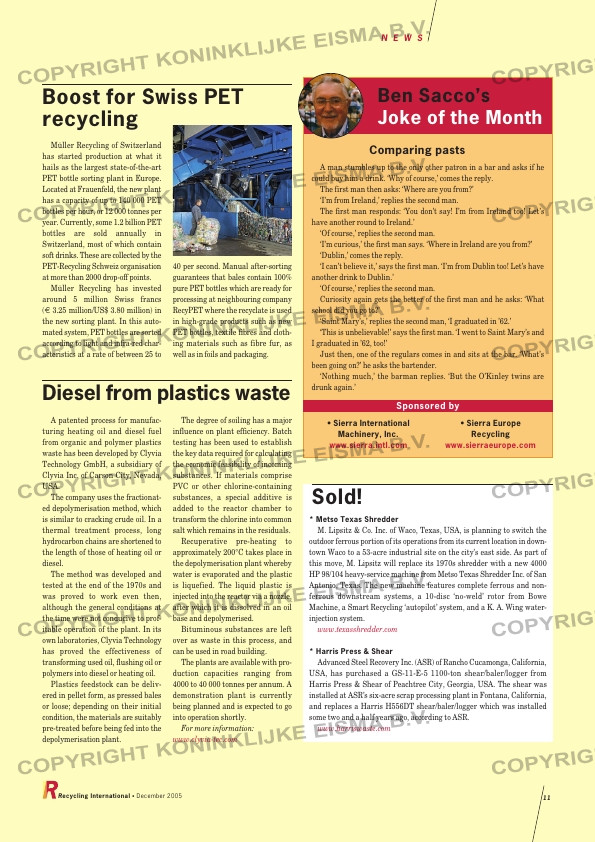Page 11 from: December 2005

N E W S
Recycling International • December 2005 11
Comparing pasts
A man stumbles up to the only other patron in a bar and asks if he
could buy him a drink. ‘Why of course,’ comes the reply.
The first man then asks: ‘Where are you from?’
‘I’m from Ireland,’ replies the second man.
The first man responds: ‘You don’t say! I’m from Ireland too! Let’s
have another round to Ireland.’
‘Of course,’ replies the second man.
‘I’m curious,’ the first man says. ‘Where in Ireland are you from?’
‘Dublin,’ comes the reply.
‘I can’t believe it,’ says the first man. ‘I’m from Dublin too! Let’s have
another drink to Dublin.’
‘Of course,’ replies the second man.
Curiosity again gets the better of the first man and he asks: ‘What
school did you go to?’
‘Saint Mary’s,’ replies the second man, ‘I graduated in ’62.’
‘This is unbelievable!’ says the first man. ‘I went to Saint Mary’s and
I graduated in ’62, too!’
Just then, one of the regulars comes in and sits at the bar. ‘What’s
been going on?’ he asks the bartender.
‘Nothing much,’ the barman replies. ‘But the O’Kinley twins are
drunk again.’
Ben Sacco’s
Joke of the Month
Sponsored by
• Sierra International
Machinery, Inc.
www.sierra.intl.com
• Sierra Europe
Recycling
www.sierraeurope.com
* Metso Texas Shredder
M. Lipsitz & Co. Inc. of Waco, Texas, USA, is planning to switch the
outdoor ferrous portion of its operations from its current location in down-
town Waco to a 53-acre industrial site on the city’s east side. As part of
this move, M. Lipsitz will replace its 1970s shredder with a new 4000
HP 98/104 heavy-service machine from Metso Texas Shredder Inc. of San
Antonio, Texas. The new machine features complete ferrous and non-
ferrous downstream systems, a 10-disc ‘no-weld’ rotor from Bowe
Machine, a Smart Recycling ‘autopilot’ system, and a K. A. Wing water-
injection system.
www.texasshredder.com
* Harris Press & Shear
Advanced Steel Recovery Inc. (ASR) of Rancho Cucamonga, California,
USA, has purchased a GS-11-E-5 1100-ton shear/baler/logger from
Harris Press & Shear of Peachtree City, Georgia, USA. The shear was
installed at ASR’s six-acre scrap processing plant in Fontana, California,
and replaces a Harris H556DT shear/baler/logger which was installed
some two and a half years ago, according to ASR.
www.harriswaste.com
Sold!
Boost for Swiss PET
recycling
Müller Recycling of Switzerland
has started production at what it
hails as the largest state-of-the-art
PET bottle sorting plant in Europe.
Located at Frauenfeld, the new plant
has a capacity of up to 140 000 PET
bottles per hour, or 12 000 tonnes per
year. Currently, some 1.2 billion PET
bottles are sold annually in
Switzerland, most of which contain
soft drinks. These are collected by the
PET-Recycling Schweiz organisation
at more than 2000 drop-off points.
Müller Recycling has invested
around 5 million Swiss francs
(€ 3.25 million/US$ 3.80 million) in
the new sorting plant. In this auto-
mated system, PET bottles are sorted
according to light and infra-red char-
acteristics at a rate of between 25 to
40 per second. Manual after-sorting
guarantees that bales contain 100%
pure PET bottles which are ready for
processing at neighbouring company
RecyPET where the recyclate is used
in high-grade products such as new
PET bottles, textile fibres and cloth-
ing materials such as fibre fur, as
well as in foils and packaging.
A patented process for manufac-
turing heating oil and diesel fuel
from organic and polymer plastics
waste has been developed by Clyvia
Technology GmbH, a subsidiary of
Clyvia Inc. of Carson City, Nevada,
USA.
The company uses the fractionat-
ed depolymerisation method, which
is similar to cracking crude oil. In a
thermal treatment process, long
hydrocarbon chains are shortened to
the length of those of heating oil or
diesel.
The method was developed and
tested at the end of the 1970s and
was proved to work even then,
although the general conditions at
the time were not conducive to prof-
itable operation of the plant. In its
own laboratories, Clyvia Technology
has proved the effectiveness of
transforming used oil, flushing oil or
polymers into diesel or heating oil.
Plastics feedstock can be deliv-
ered in pellet form, as pressed bales
or loose; depending on their initial
condition, the materials are suitably
pre-treated before being fed into the
depolymerisation plant.
The degree of soiling has a major
influence on plant efficiency. Batch
testing has been used to establish
the key data required for calculating
the economic feasibility of incoming
substances. If materials comprise
PVC or other chlorine-containing
substances, a special additive is
added to the reactor chamber to
transform the chlorine into common
salt which remains in the residuals.
Recuperative pre-heating to
approximately 200°C takes place in
the depolymerisation plant whereby
water is evaporated and the plastic
is liquefied. The liquid plastic is
injected into the reactor via a nozzle,
after which it is dissolved in an oil
base and depolymerised.
Bituminous substances are left
over as waste in this process, and
can be used in road building.
The plants are available with pro-
duction capacities ranging from
4000 to 40 000 tonnes per annum. A
demonstration plant is currently
being planned and is expected to go
into operation shortly.
For more information:
www.clyvia-tec.com
Diesel from plastics waste
RI_019 NEWS 02-12-2005 11:58 Pagina 11



